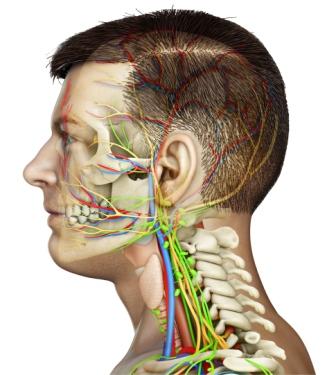Lili Gill, LMT, CPMT, Certified Lymphedema Therapist

The intention of the Neuro-Lymphatic protocol is to encourage the flow and rhythmic movement of lymph and cerebro-spinal fluid. This process may help keep the fluid clear of pathogens and protein build up. The most important roles of the lymphatic system are to help the body maintain fluid homeostasis and to activate the immune system response by hosting B cells, T cells and macrophages that attack viruses and other pathogens. New research has shown that the brain and central nervous system may be susceptible to physiological imbalances if the lymphatic system is not functioning properly. Scroll down to the bottom fo the page to read more about the development of the protocol as well as the scientific research that is at its foundation.
The possible benefits of Neuro-Lymphatic Therapy are:
- reduced cranial fluid pressure that is found with conditions such as traumatic brain injuries, brain tumors, cranial surgical procedures, encephalomyelitis, hydrocephalus
- reduced ocular fluid build up that accompanies glaucoma and macular degeneration
- reduced symptoms of migraine headaches and ischemic stroke recovery
- regulation of the natural circadian rhythm and improved sleep patterns
- reduced length and severity of autoimmune flareups such as chronic fatigue syndrome
- a slowing down of the progress of neuro-degenerative diseases such as Alzheimer's, multiple sclerosis and Parkinson's
The session incorporates manual lymphatic drainage strokes with cranial sacral and myofascial release holds. It is performed with the clients lying face up on a massage table fully clothed. There are many positive potential side effects such as reduced sinus pressure, reduced neck and back pain, improved digestion to name a few. There has been a wonderful response from all of my clients who have received the therapy.
Neuro-Lymphatic Therapy was developed by Carmen Recupero of Monarch Education based on the recent discoveries of lymphatic pathways in the meninges of the brain. In 2015, Drs. Louveau, Harris, Kipnis, and Da Mesquita with their team of medical researchers at UVA, shared their findings of lymphatic pathways in the meninges of the brain. These vessels play a vital role in clearing the cerebral spinal fluid and maintaining homeostasis and immune system health in our brains. Their research showed that when these vessels are compromised, there can be a build up of proteins and plaques in the brain. Since their discovery (which is regarded by the NIH as one of the most important medical discoveries of the decade), much more research has been done linking the glymphatic system (the lymphatics of the brain) with neurological disorders such as multiple sclerosis, Alzheimer's disease, Parkinson's disease, brain tumors, autoimmune disorders, and anxiety. See the links below to read about some of the studies.
Revisiting the Mechanisms of CNS Immune Privilege
Morphological and Functional Analysis of CNS-Associated Lymphatics
The Meningeal Lymphatic System: A New Player in Neurophysiology
Functional aspects of meningeal lymphatics in ageing and Alzheimer's disease
CNS lymphatic drainage and neuroinflammation are regulated by meningeal lymphatic vasculature
